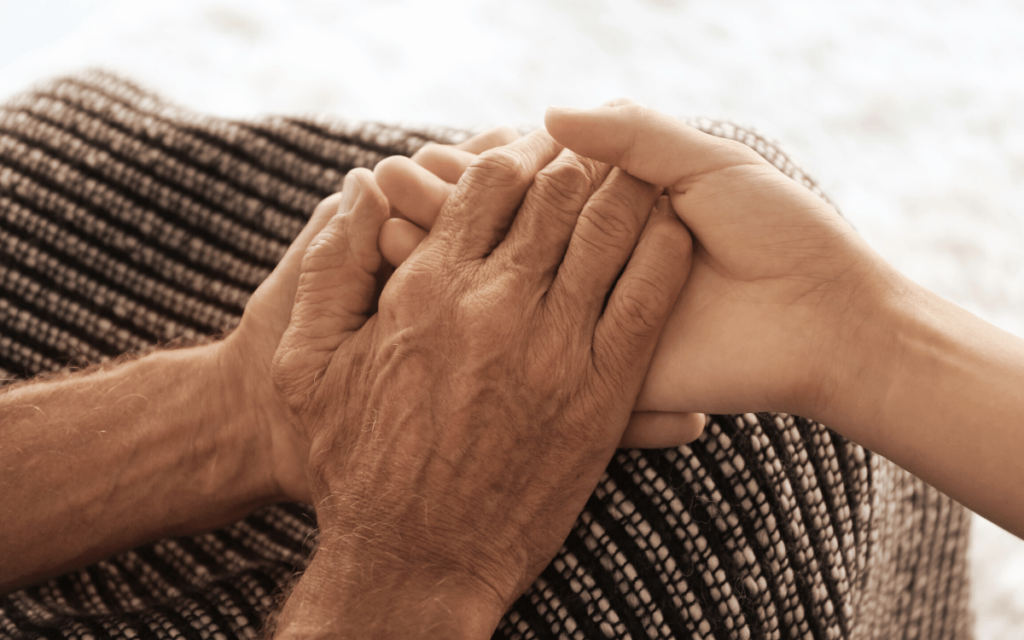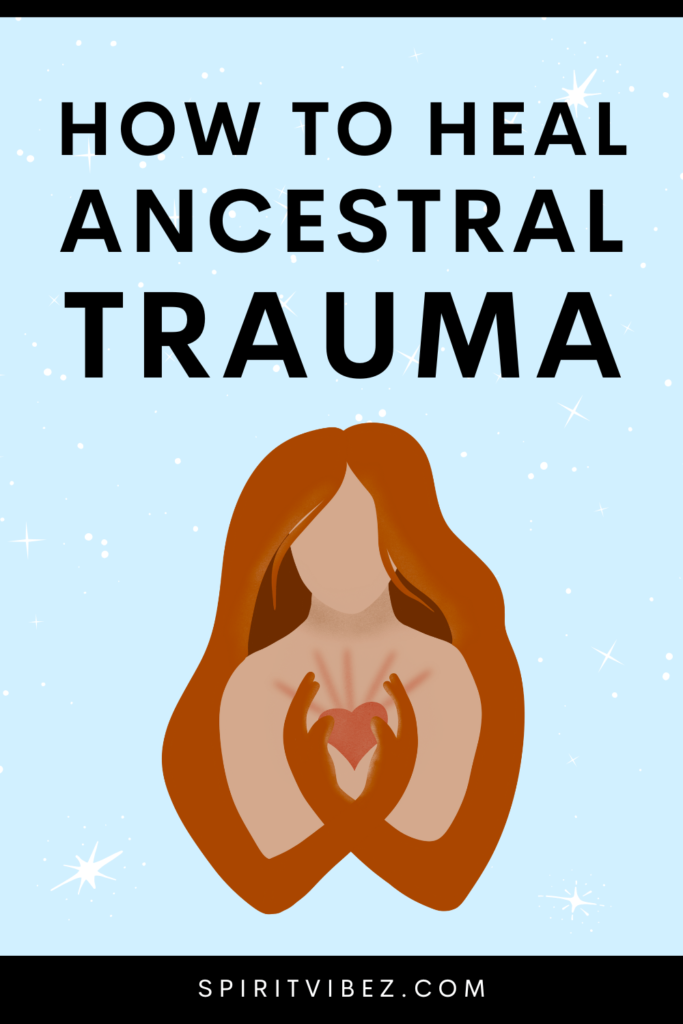Last Updated on September 14, 2023

Have you ever felt like you were carrying a burden that you couldn’t explain?
Maybe you struggle with chronic pain or anxiety, or you find yourself repeating patterns of behavior that don’t serve you.
You may be carrying the weight of ancestral trauma, the traumatic experiences of your ancestors that have been passed down through the generations.
In today’s article, you’ll learn all about what ancestral trauma means, the signs of unhealed trauma, and how to heal with ancestral healing techniques.
What is ancestral trauma?
Ancestral trauma refers to the traumatic experiences of our ancestors that have been passed down through the generations. Ancestral trauma examples can include events such as war, genocide, enslavement, forced migration, and other forms of violence and oppression.
The effects of these traumatic experiences can be passed down through the generations in several ways. For example, children who grow up in homes where there is ongoing trauma or abuse may be more likely to experience mental health issues and engage in unhealthy behaviors.
Similarly, the trauma experienced by our ancestors can manifest in physical health issues, such as chronic pain or autoimmune disorders, that may be passed down through the genes.
In addition to physical and mental health issues, ancestral trauma can also manifest in patterns of behavior and thought that have been passed down through the family line. That can include negative beliefs about yourself or your worth, difficulty trusting others, or unhealthy coping mechanisms.
Healing ancestral trauma involves acknowledging and addressing the trauma that has been passed down through the generations, as well as taking steps to break the cycle of trauma within our own lives.
It can be a difficult and emotional process, but it is an important step in creating a healthier future for yourself and your loved ones.
See also: How to heal yourself emotionally
Signs of ancestral trauma
Here are 10 signs that may indicate the presence of ancestral trauma:
1. Physical health issues: Chronic pain, autoimmune disorders, and other conditions that seem to have no clear cause can be signs of ancestral trauma.
2. Mental health issues: Ancestral trauma may manifest as mental health issues such as anxiety, depression, and PTSD.
3. Negative patterns of behavior and thought: Low self-worth, difficulty trusting others, and unhealthy coping mechanisms can be passed down through the generations as a result of ancestral trauma.
4. A sense of disconnection or not belonging: Feeling a sense of disconnection from your cultural or familial roots can be a sign of ancestral trauma.
5. Difficulty forming or maintaining close relationships: Ancestral trauma may cause issues with attachment and trust, leading to difficulty forming or maintaining close relationships.
6. Difficulty managing emotions: Ancestral trauma may lead to difficulty managing emotions, such as having extreme or intense emotional reactions to situations.
7. Difficulty with self-regulation: Ancestral trauma may also manifest as difficulty with self-regulation, including issues with impulse control and self-destructive behaviors.
8. Identity crisis: Ancestral trauma can lead to confusion or a lack of clarity around your identity and sense of self.
9. Disassociation: Disassociating from your thoughts, feelings, and surroundings may be a coping mechanism if you are dealing with ancestral trauma.
10. Intrusive thoughts or flashbacks: Intrusive thoughts or flashbacks to traumatic events can be a sign of ancestral trauma.
Again, it’s important to note that these signs can be caused by a variety of factors, and it’s not always possible to attribute them solely to ancestral trauma.
If you are concerned about the presence of ancestral trauma in your life, it may be helpful to speak with a therapist or other mental health professional for further guidance.
Benefits of ancestral healing
Ancestral healing involves acknowledging and addressing generational traumas and patterns within a family or cultural lineage.
Its benefits include healing generational trauma, personal growth, emotional release, improved relationships, cultural reconnection, breaking negative patterns, and promoting physical and mental well-being.
Healing ancestral trauma empowers you, fosters emotional resilience, contributes to holistic healing, and can even aid in social healing by addressing historical injustices.
Keep in mind that the effectiveness of ancestral healing varies based on beliefs and experiences.
How to heal ancestral trauma
Healing from ancestral trauma involves acknowledging and addressing the traumatic experiences of our ancestors that have been passed down through the generations, as well as taking steps to break the cycle of trauma within our own lives.
Here are some specific steps on how to heal your ancestral lineage:
1. Educate yourself about ancestral trauma
Understanding the concept of ancestral trauma, as well as the specific traumatic experiences of your ancestors, can help you to better understand the root causes of any issues you may be facing in your own life.
That may involve researching your family history, reading books or articles on the topic, or speaking with a therapist or other mental health professional who has expertise in ancestral trauma.
2. Seek out therapy or other forms of support
Healing ancestral trauma can be a difficult and emotional process, and it may be helpful to work with a therapist or other mental health professional to support you through the process.
Therapy can provide a safe and confidential space to explore your feelings and thoughts, as well as to learn coping strategies to manage the effects of ancestral trauma.
3. Practice self-care
Taking care of yourself physically and emotionally is essential to the healing process. That may include activities such as exercise, meditation, or spending time in nature.
It’s also important to prioritize getting enough sleep, eating a healthy diet, and engaging in activities that bring you joy and relaxation.
See also: 15 self-care tips for your mind, body, and spirit
4. Connect with your ancestors
Finding ways to connect with your ancestors, whether through researching your family history or participating in cultural traditions, can help you to feel a sense of connection and belonging.
That can be especially helpful if you have a sense of disconnection from your cultural or familial roots.
5. Break the cycle of trauma
Once you have worked through your ancestral trauma, it is important to take steps to break the cycle of trauma within your own family.
You might have to set healthy boundaries, seek out support for yourself and your loved ones, and work to create a safe and supportive environment for future generations.
The process of healing from ancestral trauma can be difficult and emotional, but it is an important step in creating a healthier future for ourselves and our loved ones.
Ancestral healing techniques
Ancestral healing techniques include a range of practices to help you heal generational wounds.
Here are some powerful techniques to try:
1. Meditation and mindfulness: Meditation helps you connect with your ancestral roots by exploring your lineage and becoming attuned to your inner self. By focusing on breath, thoughts, and sensations, you can gain insights into inherited patterns and release emotional burdens.
2. Ancestral meditation: This practice involves visualizing and connecting with ancestors in a meditative state. It can foster a sense of guidance, support, and wisdom from those who came before you.
3. Affirmations: Positive affirmations are statements aimed at reprogramming negative thought patterns. Ancestral healing affirmations focus on breaking generational cycles, releasing inherited fears, and embracing positive qualities.
4. Rituals and ceremonies: Creating rituals or ceremonies to honor and heal ancestors is common in many cultures. Lighting candles, offering food or items, and reciting prayers can be ways to establish a connection and express gratitude.
5. Energy healing: Practices like Reiki or other energy healing modalities can be used to clear energetic blockages and promote healing on emotional and spiritual levels.
6. Journaling: Reflecting on ancestral stories, experiences, and emotions through writing can bring awareness to hidden patterns and emotions, leading to release and healing.
7. Art and creative expression: Creating art, music, or other forms of creative expression can serve as a channel for processing and releasing ancestral wounds and emotions.
8. Family tree analysis: Investigating family history and relationships can unveil generational patterns, facilitating understanding and resolution of underlying issues.
9. Healing circles or support groups: Participating in a group setting where you share your experiences and support one another’s healing journey can be profoundly therapeutic.
10. Generational forgiveness: Practicing forgiveness rituals aimed at healing ancestral wounds can break the cycle of resentment and promote emotional liberation.
Remember that different techniques resonate with different individuals, so it’s important to explore what works best for you.
If you’re new to ancestral healing, consider seeking guidance from experienced practitioners or therapists to ensure you approach these techniques with the appropriate understanding and intention.
If you enjoyed this post on how to heal ancestral trauma, I would be grateful if you shared it on Twitter, Facebook, or Pinterest! Thank you❤️
📌 PIN THIS POST FOR LATER


Hello, my name is Sara and I am the founder of Spiritvibez, I’m here to guide you on your spiritual journey toward healing, growth, and self-discovery. I believe that true transformation occurs when the mind, body, and spirit are aligned and working in harmony. Through Spiritvibez, I hope to inspire and empower you to deepen your spiritual practice, embrace your authentic self, and begin living your best life.

Thank you your are helping so many people. Thank you for sharing your wisdom and gifts. Love all the journals too. Do you offer any type of healing/coaching service ? I am specifically looking for someone to help me heal and release my Ancestrial trauma/karma .
You’re very welcome, and I’m glad to hear that you’ve found the information and wisdom valuable. I currently don’t offer coaching services, but there are experts who specialize in ancestral healing to help you with ancestral trauma and karma. I recommend seeking their guidance for your healing journey. Best wishes!